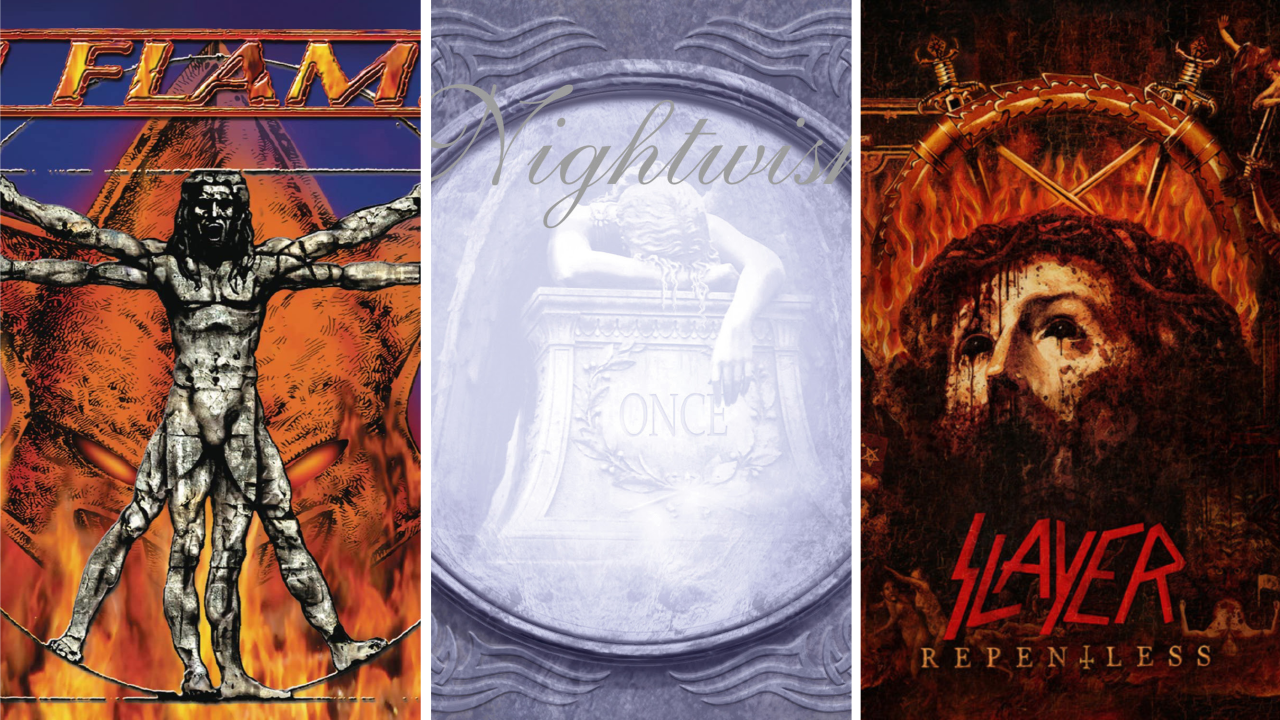A beginner’s guide to Nuclear Blast records in five essential albums
Nuclear Blast has risen from an underground German label to one of metal’s most powerful institutions. Here’s how it did it – boiled down to just five albums.

When Markus Staiger founded Nuclear Blast in 1987, he was a 21-year-old with 7,000 German marks (£3,300) and a burning passion for hardcore punk. A former tape-trader, he wanted to distribute the music he loved so much, which started with a compilation of US hardcore bands called Senseless Death. Little did anyone know that that release marked the start of what would become one of metal’s most towering labels.
Today Nuclear Blast are unstoppable, their roster being a who’s-who of modern heaviness. Sabaton, Nightwish, Anthrax, Testament, Kreator, Hatebreed, In Flames, Fear Factory and Enslaved all call it home. How the hell did such a glorious ascent happen? Well, here’s the story of the little label turned major player, as told in just five albums:

Meshuggah – Destroy Erase Improve (1995)
Meshuggah are lifetime Markus Staiger loyalists. The Swedes – back when they were still thrashers indebted to Justice-era Metallica – signed to a burgeoning Nuclear Blast before their debut album Contradictions Collapse. They didn’t leave until Markus did, jumping ship to join him at the newly-started (and similarly-named) Atomic Fire Records in 2021.
Second album Destroy Erase Improve is when Meshuggah became Me-fucking-shuggah. Eschewing any and all thrash conventions, they flourished into the djent progenitors we all know and love, polyrhythmic drumming and rhythm guitar smacking your ears ruthlessly. It only reached number 43 in Sweden, but it’s since been critically lauded and called an ahead-of-its-time influence on tech-metal. The Nuclear Blast/Meshuggah tandem would only grow more fruitful as it went, too, with 2002’s Nothing becoming the label’s first album to chart in the United States. Then there was the wildfire success of Obzen and Bleed, which somehow saw Meshuggah make complicated and rib-shattering metal into a sound that the masses could get addicted to.
In Flames – Clayman (2000)
In Flames’ ditching of traditional melodeath in favour of more arena-ready alt-metal was enormously controversial. 2010s albums Siren Charms and Battles were especially savaged by critics and fans upon release. What made the shift all the more frustrating was that, when it came to balancing heavy metal authenticity with a play for wider recognition, the band had already nailed it on Clayman.
In Flames’ fifth album is both hard-hitting and supremely listenable. Just listen to signature song Only For The Weak, where, over a bouncing groove metal drumbeat, Anders Fridén catchily howls, “Sell me the infection! It’s only for the weak!” On Bullet Ride, an introduction of escalating guitars crashes down into a pulse-pounding main riff, then Pinball Map tilts snarling thrash into a radio rock chorus years before American metalcore adopted the formula. For the band, Clayman spelt chart success in Germany, Switzerland and, err, Scotland, and more importantly catapulted the Gothenburg leaders into some stacked tours across the United States.
Dimmu Borgir – Puritanical Euphoric Misanthropia (2001)
After the murder of Mayhem mastermind Øystein “Euronymous” Aarseth in 1993, the Norwegian black metal scene splintered. Enslaved and Emperor went more progressive, Immortal went more anthemic and Burzum went to prison. Dimmu Borgir, meanwhile, leaned into all-out symphonic pomp to create some of the genre’s most mainstream moments (not counting scandalous newspaper headlines).
Sign up below to get the latest from Metal Hammer, plus exclusive special offers, direct to your inbox!
Upon release, Dimmu’s third album, Enthrone Darkness Triumphant, reached number 26 in Finland and 75 in Nuclear Blast’s native Germany. 2001’s Puritanical Euphoric Misanthropia then made such success look pathetic by cracking the top 20 of album charts across Europe. The symphonic grandeur – which was actually played by an orchestra this time, not just some synths – and the cover of Twisted Sister’s Burn In Hell showed a band not afraid to contort evil music for mass consumption. To this day, it’s all a bit controversial among black metal gatekeepers, but Puritanical… is excellent, so fuck ’em. Follow-up Death Cult Armageddon later reached number two in Norway and became the first Nuclear Blast album to sell 100,000 units in the States.
Nightwish – Once (2004)
If you live in the US or any other market where power metal isn’t a predominant form of heavy music, you may not appreciate just how fucking massive Nightwish actually are. The Finnish symphonic metal powerhouse have charted at number one in their home country with every album since 2000, and they’re routinely in the top 10 in Germany, Sweden, Greece and Austria. Plus, to this day, 2004’s Once is the best-selling album that Nuclear Blast has ever put out.
Despite being Nightwish’s final album with OG frontwoman Tarja Turunen, Once is a bombastic triumph. Ghost Love Score is a progressive, long-running opera that’s overblown in the very best of ways. Meanwhile, Wish I Had An Angel offers four minutes of concise pop-metal majesty that still makes arena crowds go batshit, and The Siren pushes the boat out to sitars and Eastern-inspired melodies. Nightwish already had legions of imitators by 2004, but this magnum opus telegraphed just how far ahead of everyone else the Finns were when it came to sublimely silly heavy metal.
Slayer – Repentless (2015)
All things must die. Time restlessly marches on and, no matter what, this too shall pass. As metalheads harrowingly discovered in January 2018, not even gods, like the satanic thrash metal deities Slayer, can last forever. The announcement that Tom Araya and Kerry King’s lightspeed savages would be hanging up their spiked gauntlets in 2019 meant that the Nuclear Blast-released Repentless would suddenly become their swansong.
By 2015, the label had become a home for thrash, having signed Testament, Anthrax and Kreator. Repentless reaffirmed that status, becoming the highest-charting Nuclear Blast album stateside when it raged its way to number four. Musically, it was Slayer being Slayer, furiously scrapping at your brain while Tom roared about serial killers and the like. Although it wasn’t a game-changer as celebrated as the Unholy Trinity of Reign In Blood, South Of Heaven and Seasons In The Abyss, it marked the California crazies bowing out on their own, anarchic terms. On Nuclear Blast, Slayer’s campaign for absolute destruction ended with one archetypically destructive blow.

Louder’s resident Gojira obsessive was still at uni when he joined the team in 2017. Since then, Matt’s become a regular in Metal Hammer and Prog, at his happiest when interviewing the most forward-thinking artists heavy music can muster. He’s got bylines in The Guardian, The Telegraph, The Independent, NME and many others, too. When he’s not writing, you’ll probably find him skydiving, scuba diving or coasteering.
